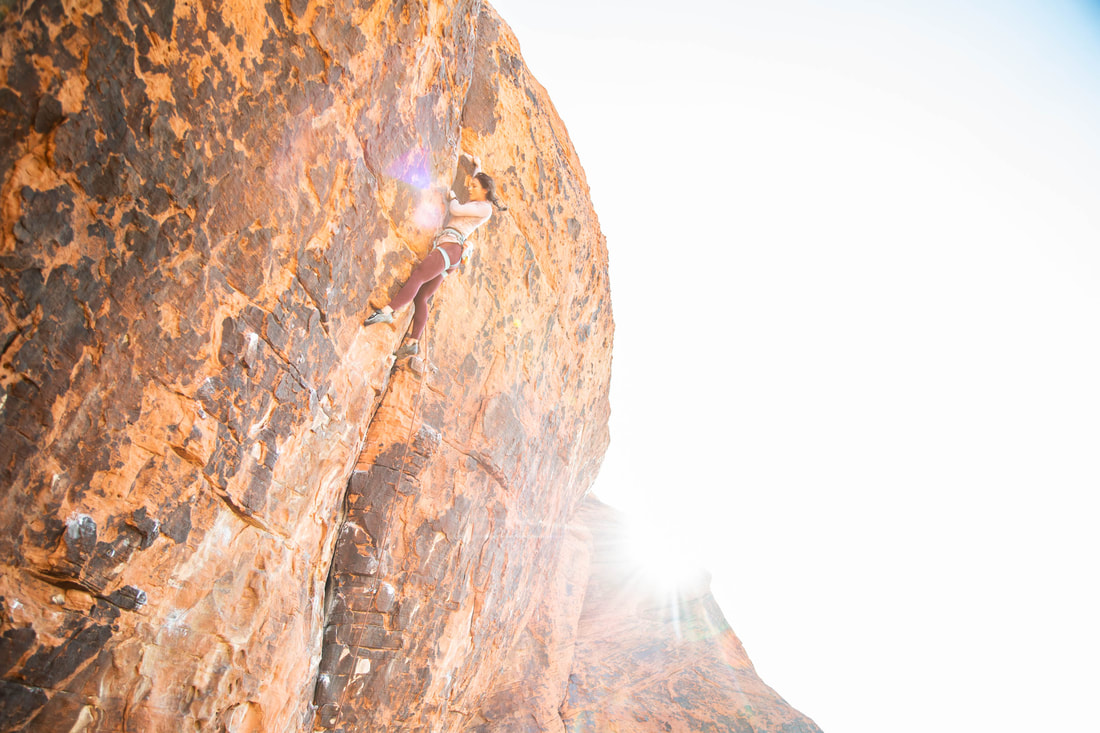Photo Credit: Irene Yee (Lady Lockoff)
“Our life is shaped by our mind, for we become what we think.”-Buddha
Mental toughness can be described as our ability to perform at the upper range of our skill no matter the circumstances. Since our thoughts shape our expectations, self-talk, and our performance, it’s important to devote time to train our mind.
There is no short supply of resilience in top performing athletes. It is one quality that professional and amateur athletes have in common. Resilience, or grit, builds mental toughness.
Since climbing is said to be 90% mental and 10% physical, devoting special attention to building mental toughness could be the best investment you make.
Here are three tips to build mental toughness.
There is no short supply of resilience in top performing athletes. It is one quality that professional and amateur athletes have in common. Resilience, or grit, builds mental toughness.
Since climbing is said to be 90% mental and 10% physical, devoting special attention to building mental toughness could be the best investment you make.
Here are three tips to build mental toughness.
Clarify Your Goals
It’s difficult to stay motivated when you are unclear on how your current plan connects to your vision. Having clarity in your vision is what is most necessary for success in working towards your dreams. To clarify your goals, perhaps try the steps below (and write it all down):
- Identify a specific goal.
- Evaluate who you are doing this for. If it’s not you, that’s a red flag. (See the "Use Words Powerfully" section below to identify words that may indicate you are doing something for someone else other than yourself).
- Tie your goal to your core values. Your core values make up your fundamental beliefs (Find a helpful definition of core values here.)
- Take inventory of your surroundings. Gather information on what physical equipment, tools, and space you have around you to help you achieve your goal. Use your imagination, and perhaps think of what you can build and create.
- Take inventory of your mental toolbox. Use your personality strengths. (Don’t know what they are? Click here to take a free test to assess your personality strengths.) Utilize your top and bottom 5 personality strengths to help you accomplish mini goals and action plans (ones you’re naturally good at, and others that require more work.)
- Practice visualization. One of my favorite visualization techniques is practicing a “Life in the Future” drill. Look at your goal through the lens of success, then failure:
- Success Questions: What if you expected to succeed? How would that change your mentality? What did that success look like? What systems, resources, and accountability did you have?
- Failure Questions: Imagine if you do not achieve your goal. How would you feel?
Our lives will always be in flux. It’s important to build a plan with flexibility. Once you have revisited and clarified your goals, you can focus on fine tuning your mental strength.
Use Words Powerfully
Your words have a profound effect on your thoughts. How you talk about training, diet, and lifestyle can change the way you think about it. Listen closely to the words you use. If you speak about how you “should/need to/have to” get enough sleep, train hard, and eat well, it could be an indication that you are disconnected to your ‘why’.
If you want to change your mindset surrounding your goals, watch your mouth. Change your words instead to I “want to/get to/am excited to”. If you can’t say those words honestly, then maybe it’s time to go back to step one, and evaluate who exactly you are pursuing these goals for.
Another powerful way to use your words is through developing mantra or cue words. When you’re pushing your limits or experiencing fear, it's important to utilize a mantra, or set of cue words (after you have established that you are, indeed, safe), to calm your mind and body. Developing a mantra, a short meaningful phrase you can repeat to yourself, can help you remain focused and clear in pressing times. Some examples are:
- By endurance we conquer.
- This is for me.
- I am strong.
- I am in control.
- Suffer more.
- Let the force flow through you. (Yes, Star Wars reference.)
Maybe if you’re not ready for a full on mantra, you can simply develop meaningful cue words to center you. Cue words are more specific in nature, as they focus your attention on one important aspect of movement or mindset. Cue Word examples:
- Push.
- Breathe.
- Focus.
- Flow.
- Now.
Words have great power, both the ones we say in our minds and aloud. We all know the famous quote by Uncle Ben (Spiderman/Peter Parker’s uncle), “With great power, comes great responsibility.” So, get creative and explore what words move you. You may discover a word that unlocks your mental and physical game.
Push Your Limits
Want a good growth environment? Get uncomfortable. We can either place ourselves in a situation that makes us uncomfortable (such as practicing failure) or, maybe we are already immersed in discomfort. If you are already experiencing discomfort, I recommend the following for improving your mindfulness:
- Lean into the discomfort. What is the lack of climbing exposing in you? While exercise is a wonderful tool for mental health, it can also become a crutch in avoiding what we really need. Grab your journal (or open notes on your phone). Take some time and write down what is feeling exposed in you. Once the discomfort has been brought to light, you can decide if it’s something you need to work on alone, or with some help.
- Begin your day with gratitude, affirmations, and a reminder of your life vision (your “why”). Beginning our day with what we have, who we are, and what we hope for can change the outcome of our day. I am not talking about toxic positivity here, just decluttering your brain from the negativity and perhaps current realities we are experiencing. Things will get better.
- Check in with yourself, often. How are you doing? Really. It’s easy to ignore our feelings when we are running from one thing to the next. Take some time to check in with yourself, or better yet, reach out to a friend or family member. We are all in this together.
|
Reading is also a tool that can help you face failure and learn valuable lessons in grit and performance through someone else's narrative. Read about grit, mental toughness, and resilience.
Practicing failure purposefully is another technique to help us discover new personal bests and help us become more resilient. If you don’t really know what failure feels like, you aren’t pushing yourself hard enough. Ways to practice failing:
|
While it’s not recommended for every exercise session, failure exercises can greatly increase your mental and physical strength. Through pushing yourself to failure, you will find new upper levels of your physical and mental capabilities. You have not likely discovered what all you are truly capable of if you have not failed.
Takeaways
If you’re looking for one skill to rule them all, train your mental toughness. Get very clear on your vision, use your words powerfully, and push your limits. When your mental toughness matches your physical strength, you will feel damn near unstoppable. I believe in you, now you need to believe in you.




